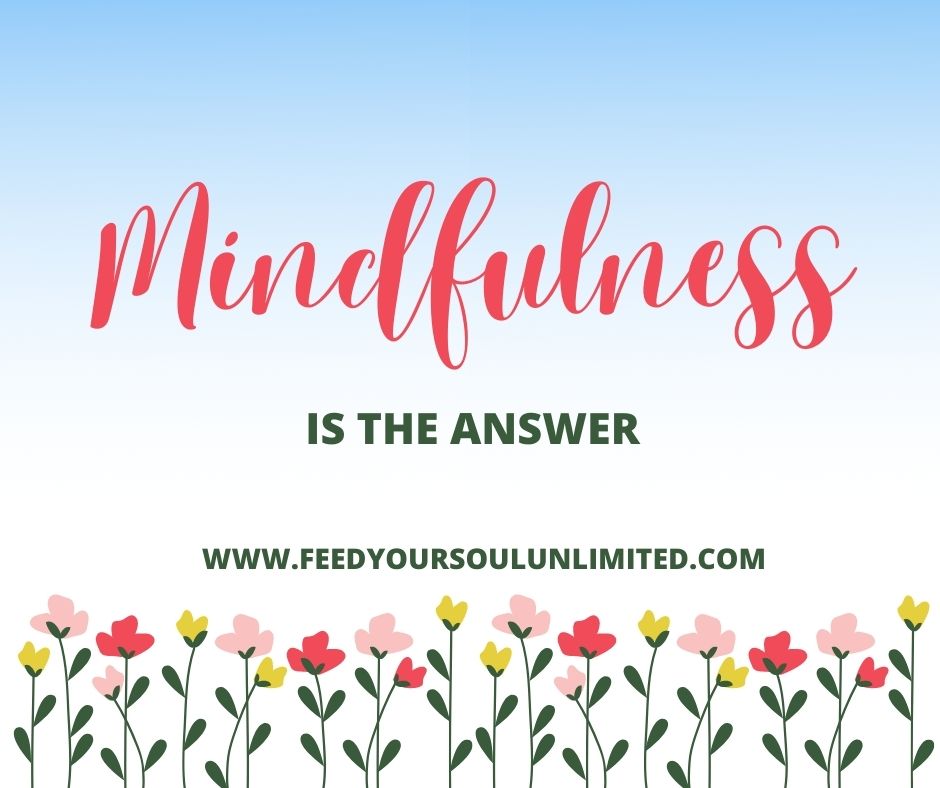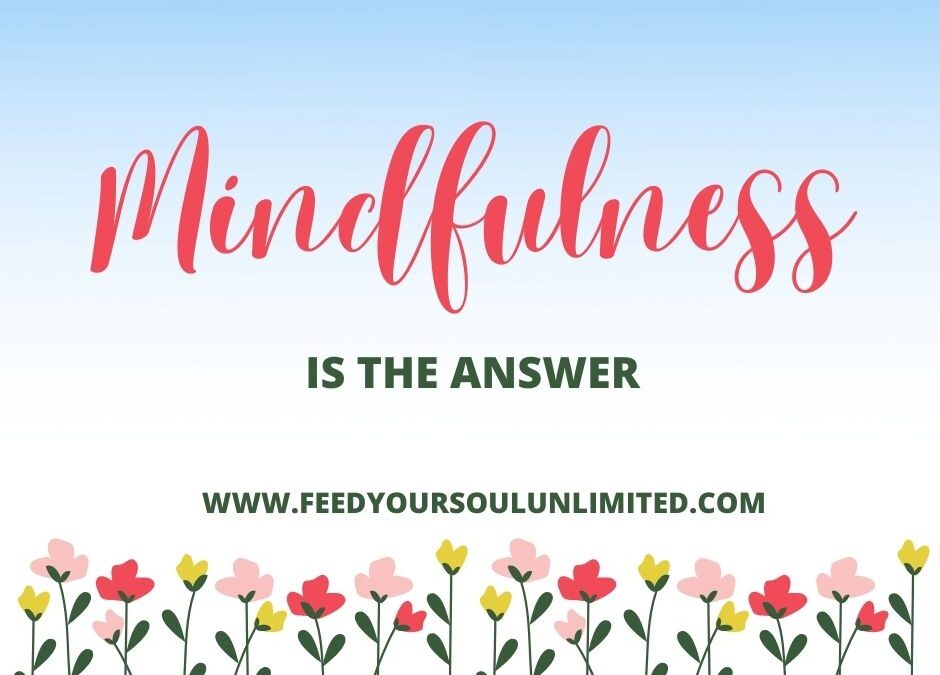I get asked A LOT, how do I stop emotionally eating?
Strangely, the answer to the question how I stop emotionally eating is to be mindful. The problem is being mindful is easier said than done.
Mindful.org says, “Mindfulness is the basic human ability to be fully present, aware of where we are, and what we’re doing, and not overly reactive, or overwhelmed by what’s going on around us.
Let’s take that definition of mindfulness and see what is going on with you right now:
- Are you fully present? Take a moment to get present.
- Are you aware of where you are?
- What are you doing? Take a moment to be aware.
- Are you reacting to anything right now?
- Are you feeling overwhelmed?
The concept of mindfulness is paying attention to what is actually happening in and around you right now.
Mindfulness is about being fully present in your body and what’s going on within you, what you’re doing, but also what’s going on around you. Sometimes what’s going on around us can be the difficult part, because we feel reactionary.
When we’re mindful, we can:
- Come back into our body.
- Assess what’s going on in us and around us.
- Then determine what to do.

How does mindfulness help with overeating?
Imaging the difference being totally present when you are eating and not responding to external or internal stimuli. Mindfulness and overeating can be tricky. It takes practicing it when we are eating and when we are not. Being mindful means, we are not soothing ourselves unconsciously with food.
When we are not mindful it can feel like we are disconnected from our body and not present to the internal nor external cues. Having the tools to reconnect with yourself helps you when you come to the table (literally and figuratively).
Mindfulness takes practice
I have been sharing lately that I’ve noticed that I am calmer and more present and mindful than I have ever been. I started a mindful practice. The beginning of January 2022, I decided I was a little too scattered a little too outside of myself, and I needed something more formal and doing it every day. I started a mindfulness practice: daily readings, affirmations, some journaling. I don’t do all of them every day, but I do at least one of them every day.
I am 100% confident that my stress has been reduced substantially what I know when my stress is reduced. I’m less likely to overeat because my stress is down. I am not reactionary to other people. I feel calmer inside of my body.
Mindfulness helps with Intuitive Eating
Intuitive Eating means we’re coming from what our body needs, coming from our insides and noticing what’s going on. This is the scary part that people talk to me about a lot is:
- How can I access in my body when I don’t trust my body?
- Why would I listen to what my body’s saying, if my body always says to just eat, or I know it’s going to tell me to eat?
- If you tell me, I can just eat food? Well, what food can I eat, because I need to know what the prescription is what the diet is, then I’ll know what to eat, then I’ll know what the plan is.
It can feel be scary to go inside of your body.
Mindfulness can give you the resource to feel empowered within your body. This mindfulness help when you are eating AND when you are just living your life. Being mindful, is the way to move out of a lot of emotions that can be detrimental to your relationship to yourself. Mindfulness can get you out of being reactionary.
How do we move into mindfulness?
You can start doing it now. One of my favorites ways is feeling yourself sitting in your seat right now.
- Feel your bottom on the chair.
- Feel your feet, where are your feet?
- Notice your hands, what are they doing?
- Notice your shoulders, where your shoulders at?
- Feel your jaw, how does it feel.
- The next thing I like to do is focus on deep breathing. Breathe in through your nose, out through your mouth. I just like to breathe in and breathe out. As I do that, I feel my shoulders drop, I feel my jaw drop, I feel myself more firmly in my seat.
Being present in your body is as simple as noticing your body. You could do that all the time! When you’re sitting to eat, feel yourself in your seat, take a deep breath. When you’re going into work, feel your feel your feet on the ground, take a deep breath. That’s how you get to be mindful. And the more mindful we are more peaceful.
How can you mindfully eat?
The other part about mindful eating is really being mindful of what you’re eating, having a plate of food, sitting down, eating one bite at a time, putting your fork down, chewing your food, swallowing your food, wipe your mouth with your napkin. This makes eating a slower process. But it’s a more mindful process.
I encourage you to be present in your body as often as possible. Being mindful is really simple, not always easy, but it has a profound effect.
Be sure to check out the video that goes with this blog here.
Kim McLaughlin, MA is a Counselor, Speaker, Podcaster, and Inspirational Coach who specializes in working with people who suffer from binge eating and emotional eating. She is a Certified Intuitive Eating Counselor. She is the author of the book Feed Your Soul Nourish Your Life! A Six Step System to Peace with Food and the Amazon #1 Best Selling book Discovery Your Inspiration.
You can find Kim on her podcast Feed Your Soul with Kim and you can find it on all podcast platforms.
Wondering if you are an emotional eater? Sign up for the free Am I an Emotional Eater Quiz.



